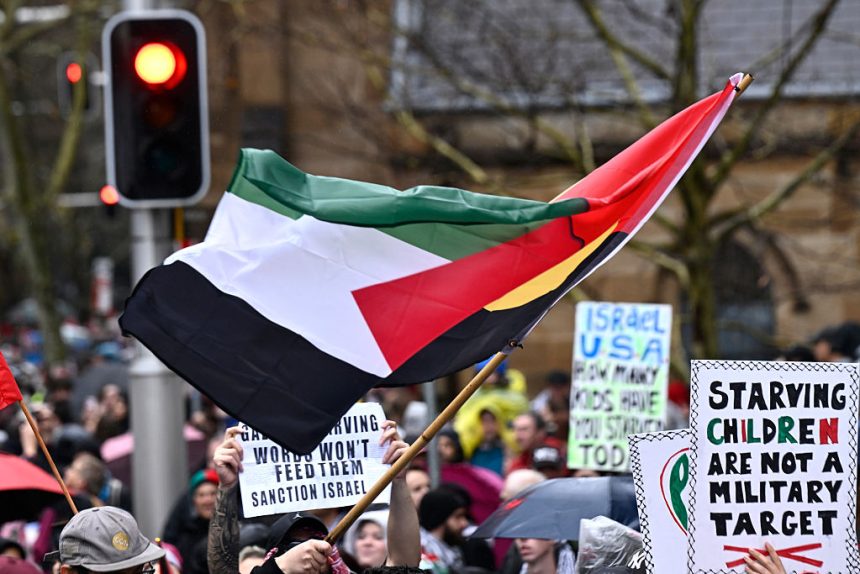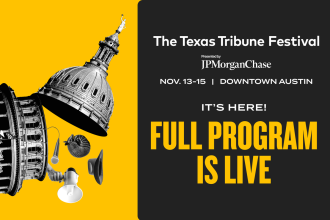Pro-Palestinian protesters demonstrate in Sydney, Australia, on August 3, 2025. Credit – Izhar Khan—Getty Images
Amid mounting international pressure on Israel to end its war in Gaza, there is growing diplomatic momentum in the West to recognize Palestinian statehood, with Australia becoming the latest to announce plans to do so.
Prime Minister Anthony Albanese said Monday that the country will recognize a Palestinian state at the United Nations General Assembly next month. Albanese said during a press conference Monday that he had spoken with Israeli Prime Minister Benjamin Netanyahu last week about needing “a political solution, not a military one” to the war in Gaza. Australia’s Foreign Affairs Minister Penny Wong said she spoke with U.S. Secretary of State Marco Rubio ahead of the announcement.
“Australia will recognise the State of Palestine at the 80th Session of the United Nations General Assembly in September, to contribute to international momentum towards a two-state solution, a ceasefire in Gaza and the release of hostages,” Albanese said in a statement. “The Netanyahu Government is extinguishing the prospect of a two-state solution by rapidly expanding illegal settlements, threatening annexation in the Occupied Palestinian Territories, and explicitly opposing any Palestinian state.”
The move comes as Israel has again amped up its offensive in Gaza over the course of its nearly two-year long war, while the Israeli government is considering a “complete conquest” of Gaza. Humanitarian organizations have warned about the humanitarian crisis and famine unfolding in Gaza, as well as the targeting and killing of journalists, while Netanyahu has claimed media bias and denied that Palestinians are starving.
Here’s what to know.
Which countries have recognized a Palestinian state?
Nearly 150 of 193 U.N. member states recognize Palestinian statehood, including most countries in Asia, Africa, and South America. But currently, only a fraction of Western countries do—mostly former members of the Soviet Union—although momentum appears to be growing.
In July, France, the United Kingdom, Canada, and Malta announced their intention to recognize a Palestinian state at the September U.N. meeting. New Zealand also said on Monday that it would “carefully weigh up its position over the next month on recognition of a state of Palestine.” Portugal, too, said in July that it is considering recognizing Palestinian statehood. They join Armenia, Slovenia, Ireland, Spain, and Norway, as well as four others around the world, which recognized Palestinian statehood in 2024.
What does it mean to recognize Palestinian statehood?
By international law, a sovereign state should have a permanent population, a defined territory, an effective government, and the ability to conduct international relations. Whether or not a country is formally recognized by other states is not a requirement of sovereign statehood, but it shapes how countries interact with each other.
With much of the world already recognizing Palestinian statehood, the shift among Western countries is widely seen as an attempt to pressure Israel towards a cease-fire. Some Western countries made a similar move a decade ago after the Israeli government annexed territory in the West Bank. Sweden in 2014 officially recognized Palestinian statehood, while U.K. lawmakers voted in favor of doing the same, although the British government did not formally recognize Palestinian statehood at the time. Much of the West has long supported a “two-state” solution, in which a Palestinian state would exist in most or all of the West Bank, Gaza Strip, and east Jerusalem, alongside the state of Israel.
Although largely seen as symbolic, the shift in recognition has been accompanied by growing censure of the Israeli government, such as Germany’s suspension of Gaza-linked weapons exports to Israel last week and a majority of Senate Democrats voting to stop arms sales to Israel at the end of July.
But elevating a Palestinian state to a full member, rather than a Permanent Observer, as it currently is, at the U.N. would require getting the U.S. on board. As a permanent member of the U.N. Security Council, the U.S. has the power to veto resolutions that could change Palestine’s membership status, which it has done in the past.
How have Israel, the U.S., and others reacted?
Israel has condemned Western countries like France, Canada, and the U.K. for their decision to recognize Palestinian statehood, arguing that it “rewards terror and risks creating another Iranian proxy, just as Gaza became.” The Israeli government opposes Palestinian sovereignty and a two-state solution.
Netanyahu called Australia’s decision “shameful” and said “it’s not going to change our position.”
“I think we’re actually applying force judiciously, and they know it. They know what they would do if right next to Melbourne or right next to Sydney you had this horrific attacks. I think you would do it, at least what we’re doing, probably maybe not as efficiently and as precisely as we’re doing it,” Netanyahu told reporters Sunday.
The war in Gaza was ignited by Hamas’ terrorist attack in southern Israel on Oct. 7, 2023, killing more than 1,200 people and taking around 250 hostages. Since then, more than 60,000 Palestinians and nearly 2,000 Israelis have been killed, according to Gaza’s Health Ministry and Israeli forces, respectively. (In the absence of independent monitoring on the ground, the Gaza Health Ministry is the primary source for casualty data relied upon by humanitarian groups, journalists, and international bodies. Its figures do not differentiate between civilians and combatants and cannot be independently verified by TIME.)
Hamas had released 140 living hostages, as of the start of July. The Israeli government believes around 20 living hostages remain in Gaza, as well as the bodies of around 30 others. Hamas reportedly offered to release all hostages in exchange for the full withdrawal of Israel’s military from Gaza and an end to the war, which a Hamas senior official said Israel rejected.
“By recognising a Palestinian state now, Australia elevates the position of Hamas,” Israel’s envoy to Australia Amir Maimon said in a statement posted to X.
Netanyahu earlier this year said that the leaders of France, Canada, and the U.K. were “emboldening Hamas” after they had signed a joint letter calling for a cease-fire and two-state solution with an independent Palestinian state.
The U.S., Israel’s biggest ally, has also rejected the recent announcements. Rubio earlier called France’s decision to recognize Palestinian statehood “reckless” and said it “only serves Hamas propaganda,” while President Donald Trump said French President Emmanuel Macron’s statement “doesn’t carry weight.”
Within Australia, the country’s move has been met with both welcome and disapproval. The Executive Council of Australian Jewry called the move a “betrayal” and that the Australian government has “committed to recognising as a State an entity with no agreed borders, no single government in effective control of its territory, and no demonstrated capacity to live in peace with its neighbours.” Meanwhile Liberal-National Coalition defense spokesperson Angus Taylor said the decision was “premature” and “rewarding Hamas.”
Labor Friends of Palestine, a rank-and-file group of the Australian Labor Party, said the move “delivers on policy long supported by Labor members who will strongly welcome this move.” Australia Palestine Advocacy Network President Nasser Mashni said the announcement was “meaningless” and a “political fig leaf” while Australia continues to trade and have diplomatic relations with Israel.
Albanese said in the press conference that the move is not only symbolic. “This is not Australia acting alone,” he said. “This is a practical contribution towards building momentum.”
Contact us at letters@time.com.








